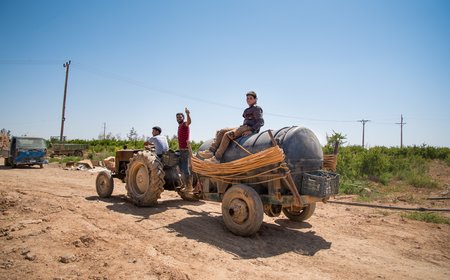Addressing Egypt's migrant workers' challenges in Jordan
This policy brief on Egyptian workers in Jordan was developed with input from NGOs and Egyptian workers. It aims to improve their rights, address labour issues, and enhance Jordan's global standing in combating slavery and human trafficking. It outlines the conditions that Egyptian migrant workers face in Jordan and specifically focus on the legal frameworks that allow Jordanian employers to exercise control over migrant workers. The policy brief also provides a set of recommended policies and actions aimed at effectively addressing the challenges encountered by Egyptian workers in Jordan.
Capturing the attention of the Jordanian government
The Information and Research Center King Hussein Foundation (IRCKHF) employed a strategic approach to secure the support of the Jordanian government by establishing a link between migrant rights and Jordan's global standing in terms of contemporary manifestations of slavery and efforts to combat human trafficking.
Numerous international reports evaluate the legislative frameworks and operational procedures implemented by countries across the globe in relation to migrant labour, coerced labour, modern forms of slavery, and human trafficking. The Global Slavery Index holds significant prominence among these reports. Based on the 2023 report, Jordan was positioned at the 23rd rank in relation to incidences of contemporary enslavement, with a prevalence rate of 10 per 1,000 individuals. According to the 2022 Trafficking in Persons Report by the U.S. State Department, Jordan has been classified under Tier 2. This categorization indicates that the Jordanian government falls short of fully meeting the minimum standards for eradicating human trafficking, although it is actively undertaking substantial endeavours towards this goal.
A significant factor influencing these evaluations is the level of control that employers exercise over migrant workers through legislation and practical measures, as well as the safeguards in place to prevent employer exploitation. The review and amendment of legislation and associated practices will have a substantial impact on enhancing Jordan's position in international indices pertaining to slavery, human trafficking, human rights, and the Sustainable Development Goals. This will bolster Jordan's dedication to international conventions and obligations, alongside attaining favorable economic and social outcomes



